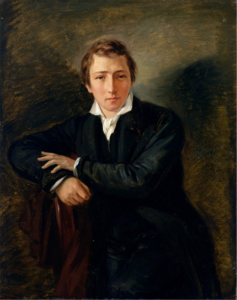The fisher girl
(Poet's title: Das Fischermädchen)
Set by Schubert:
D 957/10
[August 1828]
Part of 13 Lieder nach Gedichten von Rellstab und Heine (“Schwanengesang”), D 957
Du schönes Fischermädchen,
Treibe den Kahn ans Land –
Komm zu mir und setze dich nieder,
Wir kosen Hand in Hand.
Leg an mein Herz dein Köpfchen
Und fürchte dich nicht zu sehr,
Vertraust du dich doch sorglos
Täglich dem wilden Meer.
Mein Herz gleicht ganz dem Meere,
Hat Sturm und Ebb’ und Flut,
Und manche schöne Perle
In seiner Tiefe ruht.
You beautiful fisher girl,
Push the boat onto the land;
Come to me and sit yourself down,
We shall have a loving chat holding hands.
Lay your little head on my heart
And do not be too afraid,
After all you fearlessly take risks
Every day on the wild sea.
My heart is just like the sea,
It has storms, it ebbs and flows,
And lots of beautiful pearls
Are resting in its depths.
All translations into English that appear on this website, unless otherwise stated, are by Malcolm Wren. You are free to use them on condition that you acknowledge Malcolm Wren as the translator and schubertsong.uk as the source. Unless otherwise stated, the comments and essays that appear after the texts and translations are by Malcolm Wren and are © Copyright.
☙
Themes and images in this text:
Boats and ships Fish and fishing Floods and tides Hands Heads Hearts High, low and deep Pearls The sea Storms Under the water, sinking and drowning
As is so frequently the case in Heine’s poetry, the lines are easy to read, but not always easy to read between. Part of the problem is that we are not given the full picture, and what is provided might be unreliable. The title of the poem is ‘Das Fischermädchen‘, but all that we are told about this fisher girl is that she is beautiful and that she goes to sea regularly on a boat that is small enough to push onto the beach. She has no voice, and that appears to be deliberate. The reader has to imagine her response.
We have no information about the speaker. We can be fairly sure that it is not Heinrich Heine himself (who had never seen the open sea when he wrote the text), though it may be intended to be someone with a similar character. What does this persona have to offer the fisher girl? Why should she take a risk with someone whose heart experiences storms? What are the ‘pearls’ which he declares are on offer if she dives into the depths of this turbulent heart? Could they ever compensate her for the deep waters she would be getting into.
Why should she not be afraid? The speaker makes a seemingly clever but ultimately misleading analogy between the daily risks the girl takes when she goes fishing and the risk she would be running if she accepted his offer. This overlooks the fact that she presumably has enough experience and training to understand the physical risks of fishing, but she is almost certainly too vulnerable to expose herself to the emotional and other risks involved in the proferred relationship. She really ought to be careful: on the surface he does not appear to be as deep as he claims.
Then again, we know so little about the situation that we have to admit that there is a possibility that the girl will leap at the chance. She might like living dangerously. She might be so fed up with fish and fishing that she is happy to go on a crazy treasure hunt looking for non-existent pearls in a charming lad’s heart.
☙
Original Spelling Das Fischermädchen Du schönes Fischermädchen, Treibe den Kahn an's Land; Komm zu mir und setze dich nieder, Wir kosen Hand in Hand. Leg' an mein Herz dein Köpfchen, Und fürchte dich nicht zu sehr, Vertrau'st du dich doch sorglos Täglich dem wilden Meer. Mein Herz gleicht ganz dem Meere, Hat Sturm und Ebb' und Fluth, Und manche schöne Perle In seiner Tiefe ruht.
Confirmed by Peter Rastl with Schubert’s source, Buch der Lieder von H. Heine. Hamburg bei Hoffmann und Campe. 1827, page 186; and with Reisebilder von H. Heine. Erster Theil. Hamburg, bey Hoffmann und Campe. 1826, page 12.
First published as number XII of Drei und dreißig Gedichte von H. Heine in Der Gesellschafter oder Blätter für Geist und Herz. Herausgegeben von F. W. Gubitz. Achter Jahrgang. Berlin, 1824. In der Maurerschen Buchhandlung. Sonnabend den 27. März. 50stes Blatt, page 246.
To see an early edition of the text, go to page 186 [192 von 384] here: http://digital.onb.ac.at/OnbViewer/viewer.faces?doc=ABO_%2BZ180399009


